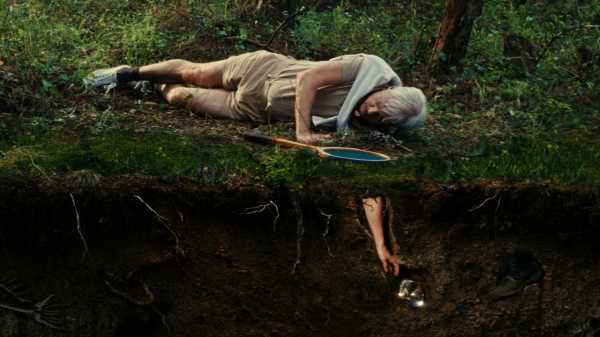
Save this storySave this storySave this storySave this story
“I think the thought of the discarded man is interesting,” the director said, in an e-mail.
As anyone who has ever tried it knows, telling strangers in an elevator that you have herpes is not the best way to make friends. Turns out, though, it is a good way to start a film. In the opening scene of Vedran Rupic’s début short, “The Diamond,” a lonely man named Stefan (Erik Sjöström) attempts just that gambit. It goes about as poorly as you would expect, and, for Stefan, things go downhill from there.
Stefan does not, in fact, have herpes, as we learn when, upon arriving home, he peels from the corner of his mouth the lurid blister that had served as a pretext for his elevator announcement—it is a fake. He also doesn’t have a friend, or a lover, or any idea how to acquire either one. He settles into a chair and watches a TV program in which beautiful people in crisp white clothes play tennis and eventually make out. “Es fácil hacer amigos cuando eres rico,” one of them says with a laugh. (“It’s easy to make friends when you’re rich.”) Stefan seizes on the idea that wealth might bring him companionship, and, the next day, when he happens upon a gleaming diamond in a hole in the forest floor, it appears that his luck may be about to change. And it does, but not in the way that he hopes.
“I think the thought of the discarded man is interesting,” Rupic told me over e-mail. “Especially today. Men as a whole are by no means a vulnerable group. But there seems to be a group of men that are lonely, that are perceived as having low value.” The central figure of “The Diamond” is one such fellow, and, according to Rupic, one of the challenges of the film “was seeing if we can make that kind of main character work.” Stefan may not be a very likable protagonist, but he is an active one, and his desperate deeds propel the film into a zone of surpassing strangeness. Rupic told me that his work is influenced by the filmmakers Michel Gondry, Charlie Kaufman, Spike Jonze, and “the Coen brothers (please call me if you are reading this).” Rupic’s film belongs in this lineage—yet, in his use of magical realism, existential bleakness, deadpan humor, and mood-leavening music, all of which wrap themselves around one another, he has created something that feels surprising and new.
I asked Rupic if he agreed with the tennis players on Stefan’s TV that it was easy to have friends if you were rich. “People are certainly nicer to you if you are successful,” he wrote. “I have had a very modest amount of success in my life, and I noticed that people seem to listen more when I speak. Which is really nice. When it comes to being rich, I’m sure something similar happens. But I think it leads to diminishing returns as you get richer. Like, how much more listening can a person do? And there are only so many words you can throw at them.” ♦
Sourse: newyorker.com






